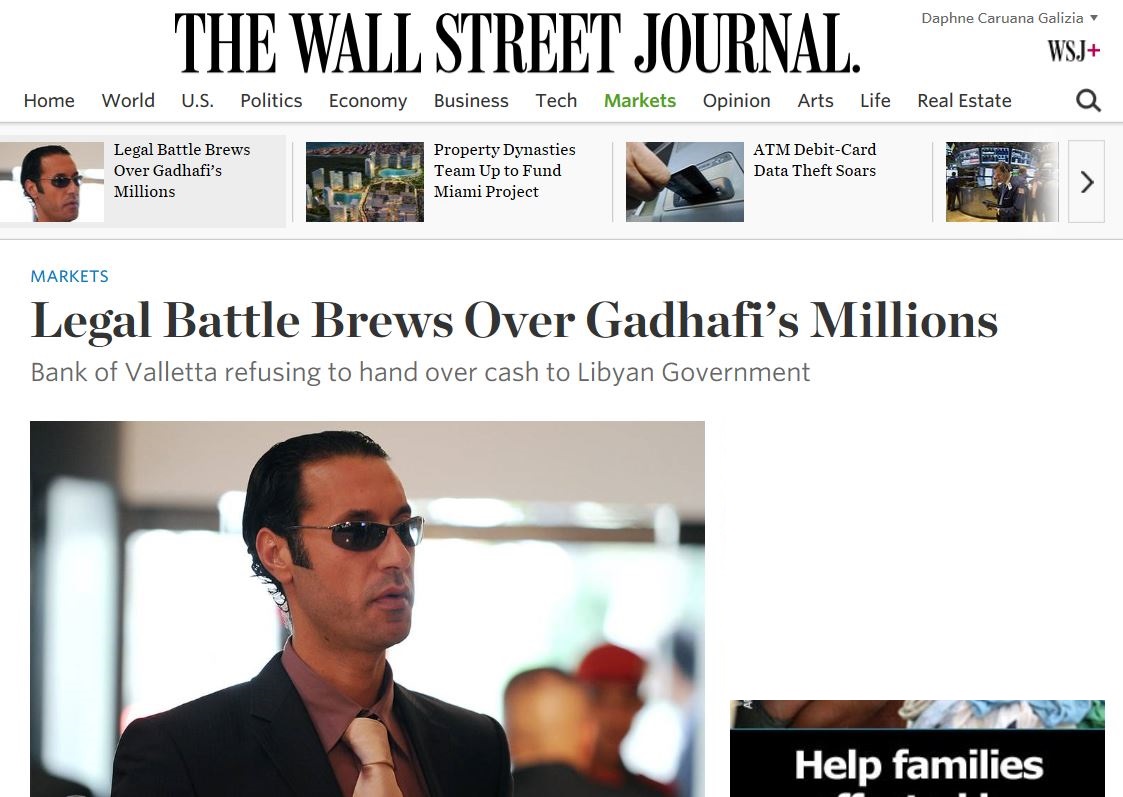Big story in the Wall Street Journal today: “Legal Battle Brews Over Gadhafi’s Millions – Bank of Valletta refusing to hand over cash to Libyan Government”
It’s a massive story, and one which Maltese journalists should have been working on. There’s a huge story right there in our own backyard, and American journalists working for the Wall Street Journal work on it instead, in a different time zone.
I had done some work on this after the fall of Gaddafi – got a closed door at the bank and repeated ‘no comments’ from former Labour Party treasurer Joe Sammut, guardian of the Gaddafi millions and accountant to Mutassim Gaddafi. And all along I’ve been thinking that with the Gaddafis dead, and all those millions controlled by a signatory in Malta, what’s to stop at least a bit of the money wandering into somebody’s war chest?
You need a subscription to the Wall Street Journal to read this story, but here is a summary.
————-
Mutassim Gaddafi, one of Muammar’s sons, was killed in the Libyan revolution in 2011. He was a “prized customer” of Bank of Valletta, and he deposited “millions” with the bank. He used his Bank of Valletta credit card on “shopping sprees in Rome, Beverly Hills and Cannes”, racking up huge bills.
Mutassim Gaddafi’s accounts at Bank of Valletta, which are “still brimming with cash” have landed the bank in an international legal battle.
Representatives of the Libyan government have filed papers in Malta’s Court of Justice, demanding that these “tens of millions of dollars” be returned to Libya, as the money did not belong to Mutassim Gaddafi, but had been stolen by him from the state when his father reigned.
“Libya accuses Bank of Valletta of ignoring fundamental rules designed to prevent Western banks from doing business with corrupt officials or facilitating money laundering,” the Wall Street Journal reports. “The bank stood to profit from the relationship because his deposits were a cheap source of funding and his massive credit-card transactions generated fees.”
The newspaper reports the response of the bank’s chief executive, Charles Borg, who said that “neither the bank nor its executives are under investigation for any wrongdoing related to Mr. Gadhafi’s accounts” and that “the bank applies strict due diligence on its customers”.
The bank says it will not hand over the money before the order to freeze Gaddafi assets worldwide is lifted.
Finance Minister Edward Scicluna told the Wall Street Journal that Mutassim Gaddafi’s bank accounts were opened before the revolution and so were “accepted as business”. The Gaddafis, he told the newspaper, “invested in Malta just like in other countries.”
Bank of Valletta is not accused of breaching sanctions, but the Libyan government says that it violated ‘know-your-customer’ rules that should have prevented it from opening an account for Mutassim Gaddafi in the first place.
Papers filed by the Libyan government in the Maltese Court of Justice show that Mutassim Gaddafi at time had as much as $60 million in his Bank of Valletta accounts. He used a Bank of Valletta platinum Visa card for “lavish spending”, sometimes spending more than €100,000/$113,000 in just a few weeks. The Wall Street Journal made these calculations itself after reviewing his credit card statements.
But here’s the twist. Mutassim Gaddafi’s mother, Safia Farkash, is still alive. Her lawyers are fighting the Libyan government for control of that money, claiming that it is hers by right as his natural heir (he had no wife or children).
The Wall Street Journal says: “The fight over Mr. Gadhafi’s remaining funds shines a light on Malta’s role as a popular destination for hidden assets. The tiny archipelago country for centuries has used its locale in the Mediterranean between Sicily and northern Africa to make it a hub for trade and money flows between continents. Today, its liberal tax and regulatory policies, its membership in the European Union and eurozone and the fact that English is widely spoken help Malta lure international business. But the EU in recent years has criticized Malta and its banks for inadequate reporting of suspicious transactions, especially involving “politically exposed people” from North Africa and Eastern Europe.
Maltese authorities dispute such characterizations, saying they adhere to strict international standards.”
The newspaper also reports: “Executives at UniCredit, which has a nearly 15% stake in Bank of Valletta and appoints one director to its board, privately distance themselves from the Maltese bank’s management, describing their interest in the bank as passive. In recent years, the Italian bank has tried to sell its stake in Bank of Valletta but hasn’t been able to find a buyer, a person familiar with the matter said.”
Mutassim Gaddafi began opening accounts at Bank of Valletta in 2002, when he was 27, using companies incorporated in Malta which he controlled. The first deposit was €500 but by 2011 he held €60 million at the bank. When he was killed, aged 36, two Bank of Valletta Visa cards were found in his wallet.
The Wall Street Journal article concludes: “Neither the Bank of Valletta nor the auditor of Mr. Gadhafi’s shell companies flagged the large money transfers in and out of the accounts as suspicious, according to a transcript of testimony that the auditor, Joseph Sammut, gave to a Maltese court in 2013. Mr. Sammut, who didn’t respond to requests for comment, said in court that he discussed the transactions with Bank of Valletta and then decided not to report them to Maltese authorities.”

